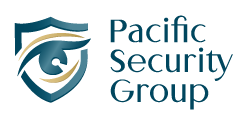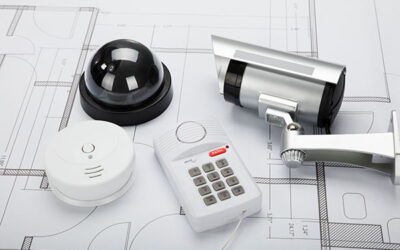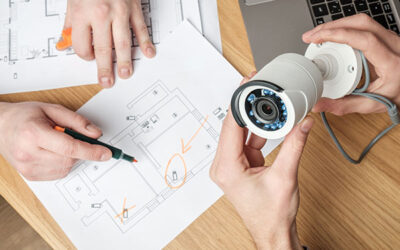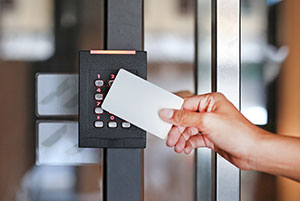In today’s world, where security concerns are increasingly at the forefront of our minds, the maintenance of your security system goes beyond a mere recommendation—it’s an absolute necessity. Acknowledging this essential aspect, it’s crucial to understand that the key to ensuring the longevity and effectiveness of your security system lies in regular and proper maintenance. Just as a well-oiled machine performs at its peak, a meticulously maintained security system guarantees optimal performance. This introduction delves into the critical role of maintenance in preventing unforeseen failures and keeping your security solution responsive and reliable. We’ll explore the various facets of routine checks and adjustments, which not only extend the life of your security system but also enhance its efficiency, providing you with unwavering peace of mind and a sense of control over your safety and that of your assets.
Understanding Your Security System
Delving into the world of security systems reveals a complex and varied landscape, essential for ensuring the safety of your premises. It’s vital to understand the different types of systems available and their respective components to appreciate their maintenance needs fully.
Types of Security Systems and Their Components
Security systems come in various forms, each tailored to specific requirements and environments. The most common types include:
- CCTV Surveillance: Comprising cameras, recording devices, and monitors, these systems provide real-time monitoring and historical footage, crucial for both prevention and investigation of incidents.
- Alarm Systems: These include motion detectors, glass break sensors, and door/window contacts, designed to alert you of any unauthorised access or breaches.
- Access Control Systems: Ranging from keypads to biometric scanners, these systems regulate and monitor access to your property, ensuring entry is limited to authorised personnel.
- Fire and Safety Alarms: Including smoke detectors and heat sensors, these systems are pivotal for early detection of fire and other hazards, safeguarding both property and life.
Each system comprises delicate and sophisticated components – cameras, sensors, control panels, and wiring – all of which demand a nuanced understanding for effective maintenance.
The Importance of Regular Maintenance
Regular maintenance of your security system is not just about ensuring its functionality; it’s about guaranteeing the safety and security of your environment. Neglecting this aspect can lead to system failures, false alarms, or, worse, undetected breaches. Routine checks and servicing ensure each component functions as intended, offering an undisrupted layer of security. Moreover, consistent maintenance helps identify and rectify potential issues before they escalate, saving time and resources in the long run. In essence, the upkeep of your security system is as crucial as the system itself, forming a fundamental part of your overall security strategy.
The Maintenance Checklist
Maintaining your security system is not a one-off task but a continuous process. Regular checks and updates are crucial in ensuring that your system remains in top-notch condition, ready to protect you and your property at all times. By adhering to a structured maintenance schedule, you can significantly extend the lifespan of your system and enhance its efficiency.
Daily Maintenance Tips
Every day, take a few minutes to ensure your system is functioning correctly. These simple steps can make a significant difference:
- Visual Inspection: Check for any visible signs of damage or tampering on equipment like cameras, sensors, and control panels.
- Alert Verification: Ensure that all system notifications and alerts are coming through and are being correctly received on your designated devices.
- Clean Lens and Screens: Wipe camera lenses and monitoring screens to ensure clear visibility and remove any dust or smudges.
These daily tasks help in the early identification of potential issues, allowing for swift action to avoid system failures.
Weekly Inspection and Testing
A more thorough check should be conducted weekly, including:
- Test Alarms and Sensors: Activate the alarms and sensors to confirm they are working correctly.
- Review Battery Levels: Check the battery levels of wireless components and replace them if needed.
- Examine Recording Quality: Review footage from CCTV cameras to ensure they are recording clearly and without interruption.
- Assess Lighting: Ensure that all security lighting is operational, especially around cameras and entry points.
Weekly inspections help maintain the reliability of your security system, ensuring all components are operational and effective.
Monthly System Check-ups
Each month, a comprehensive check-up of the entire system is recommended:
- Software Updates: Update the system software to the latest version to ensure enhanced security features and bug fixes.
- Environmental Check: Assess the impact of environmental factors such as dust, moisture, or foliage on your system components.
- Professional Inspection: Consider a monthly service from a professional security technician to examine complex system elements.
- Backup Verification: Ensure that data backups, like recorded footage, are being properly stored and can be retrieved when needed.
Monthly check-ups are vital for the long-term health of your security system, addressing any wear and tear and updating the system to the latest security standards.
Professional Maintenance: When and Why You Need It
While regular self-maintenance is crucial, there are instances where the expertise of a professional is indispensable. Professional maintenance plays a pivotal role in preserving the integrity and functionality of your security system. Understanding when and why to engage a professional is key to ensuring that your system is not just operational, but optimally effective.
Identifying Issues That Require Professional Help
Certain scenarios necessitate the involvement of a trained technician. These include:
- Complex System Faults: If your system displays recurrent or complex faults that are beyond basic troubleshooting, it’s time to call in the experts.
- Software Malfunctions: Sometimes, software issues can be intricate and require professional intervention to prevent system vulnerabilities.
- Hardware Upgrades or Replacements: Installing new components or replacing old ones should ideally be done by professionals to ensure compatibility and functionality.
- Post-Incident Evaluations: After a security breach or incident, a professional can assess and fortify your system to prevent future occurrences.
Recognising these situations and seeking professional assistance promptly can save time and protect your investment in the long term.
The Role of Professional Technicians in System Maintenance
Professional technicians bring a level of expertise and precision that is crucial for the maintenance of high-quality security systems. Their role includes:
- Expert Assessment: Technicians can perform a thorough evaluation of your system, identifying potential vulnerabilities and recommending solutions.
- Complex Repairs and Adjustments: They have the skills to carry out intricate repairs and fine-tune your system for optimal performance.
- Firmware and Software Updates: Professionals ensure that your system’s software is up-to-date, secure, and functioning at its best.
- Tailored Advice: Based on their assessment, technicians can provide tailored advice on enhancing your system’s efficiency and longevity.
Ultimately, the involvement of professional technicians in maintaining your security system is not just a matter of fixing problems—it’s about ensuring enduring reliability and security.
Common Problems and Troubleshooting
A well-maintained security system is your first line of defence in protecting your property. However, like all technology, it’s prone to certain common issues. Being able to identify and troubleshoot these problems promptly can prevent minor issues from escalating into major security risks.
How to Identify Common Security System Issues
Familiarity with common security system problems is key to quick identification and resolution. Here are some typical issues you might encounter:
- False Alarms: These can often be triggered by factors such as low battery, incorrect installation, or environmental interferences.
- Camera Malfunction: Problems like blurred images, connectivity issues, or recording failures are common in CCTV systems.
- Sensor Issues: Motion detectors or door/window sensors might fail to activate due to alignment issues, battery problems, or obstructions.
- Control Panel Errors: Issues with the control panel can range from unresponsiveness to system lockouts or communication errors.
Recognising these signs early can be crucial in maintaining the integrity of your security setup.
DIY Fixes vs. Professional Repairs
While some issues can be resolved with DIY methods, others require professional expertise. Here’s a guide to help you decide:
1. DIY Fixes:
- Battery Replacement: Often, simply replacing batteries in sensors or remotes can fix many common problems.
- Cleaning and Adjusting: Regular camera lens cleaning and repositioning sensors can solve minor operational issues.
- Resetting Systems: Sometimes, a system reset can resolve software glitches or communication problems.
2. Professional Repairs:
- Wiring Issues: Any problems related to wiring, especially in hardwired systems, should be handled by professionals to avoid safety risks.
- Software Updates and Configuration: Complex software issues or configuration changes are best managed by technicians.
- Hardware Failures: If a component of your system has physically failed, a professional repair or replacement is necessary.
Understanding the extent of an issue and your technical capabilities will help you determine whether a DIY fix is sufficient or if it’s time to call in a professional.
Enhancing System Longevity Through Maintenance
The lifespan of a security system is significantly influenced by how well it is maintained. Regular maintenance not only ensures optimal performance but also extends the system’s longevity, ensuring that your investment continues to protect you for years to come.
Long-Term Benefits of Regular Maintenance
Committing to a consistent maintenance routine has several long-term benefits:
- Reliability: Regular maintenance reduces the likelihood of unexpected breakdowns, ensuring your system is always operational when you need it most.
- Cost-Efficiency: By identifying and addressing issues early, you can avoid costly repairs and replacements in the future.
- Performance Optimisation: Maintenance ensures that every component of your security system is functioning at its best, offering you maximum protection.
- Compliance and Warranty: Keeping up with maintenance helps in adhering to warranty requirements and compliance with security standards.
Ultimately, the effort put into regular maintenance pays off by providing enduring security and peace of mind.
Tips to Prolong the Life of Your Security System
To maximise the lifespan and efficiency of your security system, consider the following tips:
- Follow Manufacturer Guidelines: Adhere to the maintenance schedule and recommendations provided by the manufacturer.
- Regular Cleaning: Keep all components, especially lenses and sensors, free from dust and debris.
- Environmental Protection: Ensure that all outdoor components are protected from environmental factors like extreme weather, dust, and sunlight.
- Software Updates: Regularly update the system’s software to protect against cyber threats and improve functionality.
- Professional Audits: Schedule annual inspections by professionals to ensure the system is up to date and functioning correctly.
- Battery Checks: For wireless systems, regularly check and replace batteries to avoid power failures.
- Educate Users: If multiple people are using the system, ensure they are educated on proper operation to prevent user errors.
By following these tips, you can significantly enhance the durability and effectiveness of your security system, ensuring it remains a reliable guardian for your property.
The Impact of Neglecting Maintenance
Neglecting the maintenance of your security system can lead to serious implications, compromising not just the system’s integrity but also the safety it is supposed to guarantee. Understanding the risks and real-life consequences of irregular maintenance highlights the importance of a diligent care routine for your security setup.
Risks of Irregular Maintenance
System Failure
Without proper maintenance, systems are prone to malfunction, potentially leaving your property unprotected.
False Alarms
Poorly maintained systems may trigger false alarms, leading to unnecessary stress and potentially fines or police charges.
Reduced Efficiency
Components like cameras and sensors can degrade over time if not regularly serviced, leading to decreased detection and recording quality.
Vulnerability to Tampering and Hacking
Systems that are not updated regularly are more susceptible to security breaches, including cyberattacks.
These risks underscore the necessity of consistent maintenance to ensure the effectiveness and reliability of your security system.
Real-Life Consequences of System Failure
Compromised Safety
In the event of a break-in or emergency, a malfunctioning system can fail to alert the necessary authorities, putting lives and property at risk.
Financial Loss
System failures can lead to property loss or damage, which may not be covered by insurance if due to inadequate system maintenance.
Legal and Compliance Issues
Businesses may face legal consequences for not adhering to prescribed security standards, which include regular system maintenance.
Loss of Trust
For businesses, a failed security system can erode customer and employee trust, impacting reputation and, ultimately, profitability.
These scenarios highlight the critical importance of regular maintenance, not just as a means to prolong system life but as a fundamental aspect of risk management and safety assurance.
Keeping Up with Technological Advancements
In an era where technology evolves at a rapid pace, keeping your security system up-to-date is not just a matter of maintaining current standards, but also of embracing advancements that can enhance security and efficiency. Staying abreast of new technologies and integrating them into your existing system is crucial for ensuring that your security measures are not just current, but also forward-thinking and robust.
Upgrading Your System
Assessing Current Needs
Regularly evaluate your security needs to determine if your current system meets them, considering factors like expanded premises or updated security risks.
Exploring Latest Features
Stay informed about the latest features and technologies in security systems. Features like AI-driven surveillance or advanced encryption can significantly boost your system’s effectiveness.
Professional Consultation
Seek professional advice to understand the potential benefits of upgrading your system and how new technology can be integrated seamlessly with your existing setup.
Budget and Planning
Plan your budget for upgrades, considering both immediate costs and long-term returns in terms of improved security and efficiency.
Integrating New Technologies
Compatibility Check
Ensure that new technologies are compatible with your existing system to avoid integration issues.
Cybersecurity Enhancements
As you integrate new technologies, prioritise cybersecurity measures to protect your system from digital threats.
Training and Adaptation
Train staff or household members on new system features and functionalities to ensure effective usage and quick adaptation.
Ongoing Evaluation
After integrating new technologies, continuously evaluate their performance and impact on your overall security strategy, making adjustments as necessary.
Staying updated with technological advancements in security is not a luxury but a necessity in today’s digital and rapidly changing world. Regular upgrades and the integration of new technologies ensure that your security system remains robust, effective, and capable of countering evolving threats.
Legal and Compliance Aspects of Security System Maintenance
In the realm of security system maintenance, legal and compliance aspects are as critical as the technical ones. Adhering to these aspects is not merely about following rules; it’s about ensuring that your security system aligns with established standards and regulations. This alignment is vital for safeguarding not only your physical assets but also your legal standing and reputation.
Understanding Regulatory Requirements
Staying Informed on Laws
Regularly update yourself on the laws and regulations applicable to security systems, which can vary regionally and nationally.
Industry-Specific Standards
Certain sectors may have specific security standards. Understanding these is crucial for businesses operating in regulated industries.
Privacy and Data Protection
If your security system involves surveillance, be aware of privacy laws and data protection regulations that govern how surveillance data should be handled.
Regular Compliance Reviews
Conduct periodic reviews of your security system to ensure ongoing compliance, particularly when there are updates in legal standards.
Compliance and Your Security System
Conducting Compliance Audits
Perform regular audits of your security system to ensure it meets all legal and regulatory requirements effectively.
Maintenance Records
Keep detailed records of maintenance activities, system upgrades, and compliance checks. These records are vital for demonstrating adherence to regulations.
Seeking Expert Advice
For complex systems or in highly regulated environments, it’s wise to seek advice from legal and compliance experts.
Implementing Training and Policies
Ensure that all personnel involved in the operation or maintenance of the security system are thoroughly trained and understand the relevant compliance policies and procedures.
Navigating the legal and compliance aspects is essential for the legitimate and effective operation of your security system. Staying informed, conducting regular audits, and seeking expert advice are key practices to ensure that your security measures are not only technically sound but also legally compliant.
Cost Analysis: Maintenance vs. Replacement
In the realm of security systems, deciding between regular maintenance and full system replacement involves a careful consideration of costs, benefits, and long-term implications. A detailed cost analysis can provide valuable insights into the most economically viable and effective choice for your security needs.
Cost-Benefit Analysis of Regular Maintenance
Initial and Ongoing Maintenance Costs
Consider the initial setup costs of your security system alongside the ongoing expenses of regular maintenance. Regular maintenance often involves smaller, periodic expenses that can significantly extend the lifespan of your system.
Savings from Preventative Care
Regular maintenance can prevent costly repairs or complete system failures. Evaluate the potential savings from avoiding major breakdowns through proactive upkeep.
Long-Term Investment Value
Assess the long-term investment value of maintenance. A well-maintained system can offer prolonged service life, thus providing better returns on the initial investment.
Impact on Insurance and Liabilities
Regular maintenance can also impact insurance premiums and reduce liability risks. A well-maintained system can lead to lower insurance costs and mitigate the risks of security breaches.
Understanding the Costs of System Neglect
Repair and Replacement Expenses
Neglecting maintenance can lead to significant repair costs or even the need for a full system replacement, which can be substantially more expensive than regular upkeep.
Risks of System Downtime
Consider the costs associated with system downtime, including potential security breaches, loss of assets, and the impact on business operations.
Depreciation and Obsolescence
Without regular updates and maintenance, security systems can quickly become obsolete, requiring more frequent replacements and thereby increasing long-term costs.
Legal and Compliance Penalties
Failure to maintain a security system can also lead to legal penalties, especially in industries where certain security standards are mandated.
Conducting a thorough cost analysis of maintenance versus replacement provides a clearer picture of the most cost-effective approach. In many cases, regular maintenance not only preserves the system’s integrity but also proves to be more economical in the long run, avoiding the hefty expenses associated with system failures and replacements.
Choosing the Right Maintenance Partner
Selecting the right maintenance partner for your security system is a decision that can significantly influence the effectiveness and longevity of your security measures. A reliable and skilled maintenance service provider can ensure that your system is always in top condition, ready to protect you and your assets.
What to Look for in a Maintenance Service Provider
Expertise and Experience
Seek a service provider with proven expertise and experience in maintaining security systems similar to yours. Check their credentials, certifications, and history of work.
Comprehensive Service Offerings
Choose a provider that offers a comprehensive range of maintenance services, covering all aspects of your security system, from software updates to hardware repairs.
Responsiveness and Reliability
A good service provider should be responsive and reliable, offering prompt assistance and support whenever needed, especially in emergencies.
Positive Customer Reviews and References
Look for providers with positive customer reviews and ask for references. Feedback from other clients can provide valuable insights into the provider’s service quality.
Building a Relationship with Your Service Provider
Clear Communication
Establish clear communication channels with your service provider. Regular updates and open dialogue can help in addressing issues promptly and effectively.
Customised Maintenance Plans
Work with your provider to develop a customised maintenance plan that suits your specific needs and schedule. A tailored plan ensures that all aspects of your system receive the attention they need.
Regular Feedback and Reviews
Provide regular feedback and conduct periodic reviews of the maintenance services. This helps in ensuring the services meet your expectations and allows for adjustments if necessary.
Long-Term Partnership
Consider building a long-term partnership with your service provider. A provider who understands the history and specifics of your system over time can offer more effective and efficient maintenance.
Choosing the right maintenance partner is crucial for the ongoing effectiveness of your security system. A partner that aligns well with your needs can provide not just technical expertise but also peace of mind, knowing that your security system is in capable hands.
Key Takeaways
Maintaining a security system is a critical task that requires attention to detail, regularity, and an understanding of the system’s complexities. The key takeaways from this discussion highlight the most crucial aspects of security system maintenance:
- Regular Maintenance is Crucial: Regular checks and upkeep prevent malfunctions and extend the life of the system.
- Professional Maintenance Matters: Certain aspects of maintenance require professional expertise to ensure the system functions optimally.
- Stay Updated with Technology: Regularly updating and integrating new technologies keeps your system effective against evolving threats.
- Legal and Compliance: Adherence to legal and compliance aspects is essential to avoid liabilities and enhance system effectiveness.
- Cost-Benefit Analysis: Regular maintenance is often more cost-effective than dealing with the consequences of neglect.
- Choosing the Right Partner: Selecting a skilled maintenance partner is essential for comprehensive and effective system upkeep.
Conclusion
The security of your property, be it a home or a business, is paramount, and a well-maintained security system is a cornerstone of this protection. Proactive maintenance not only ensures that your security system is functioning properly but also brings peace of mind, knowing that your property and loved ones are safe. Regular check-ups, staying abreast of technological advancements, and working with a trusted professional are key steps in this process.
Don’t wait for a security lapse to highlight the importance of system maintenance. Schedule a maintenance check-up today or consult with a professional to assess the health of your security system. Taking action now can prevent costly and stressful situations in the future.
FAQ’s
Why is Maintaining Security Important?
Maintaining your security system is vital for several reasons. It ensures the system’s reliability, prevents unexpected failures, and enhances the safety of your premises. Regular maintenance also helps in early detection and rectification of potential issues, thereby saving time and resources. Ultimately, it provides peace of mind knowing that your property and loved ones are well-protected.
How Often Should Security Systems Be Maintained?
Security systems should be maintained at different intervals:
- Daily: Quick visual checks and basic functionality tests.
- Weekly: More thorough inspections and testing of alarms and sensors.
- Monthly: Comprehensive system evaluations, software updates, and possibly professional inspections.
- Annually: A detailed professional inspection is recommended to ensure all aspects of the system are functioning correctly and to address any complex maintenance needs.
What Are the Common Issues Found in Security Systems?
Common issues in security systems include false alarms, camera malfunctions like blurred images or recording failures, sensor problems such as failed activations, and control panel errors like system lockouts. Regular maintenance helps identify and address these issues promptly.
Can Regular Maintenance Impact My Security System’s Longevity?
Absolutely. Regular maintenance significantly impacts the longevity of your security system. It ensures reliable operation, reduces the likelihood of costly repairs or replacements, and keeps the system updated with the latest security features. This not only extends the lifespan of the system but also ensures it continues to provide optimal protection.
What Role Do Professional Technicians Play in Security System Maintenance?
Professional technicians play a crucial role in maintaining your security system. They provide expert assessments, perform complex repairs and adjustments, ensure up-to-date firmware and software, and offer tailored advice on enhancing system efficiency. Their expertise is particularly vital for addressing intricate system faults and ensuring the system adheres to the latest security standards.




